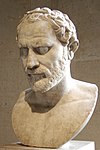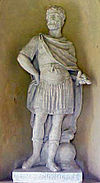Portal:Ancient Greece/Selected biography
| This Wikipedia page has been superseded by Portal:Ancient Greece and is retained primarily for historical reference. |
| Note: Article entries are now being transcluded directly on the main portal page. However, this page should be retained for historical reference. |
Selected biography

Pericles (also spelled Perikles) (c. 495 – c. 429 BC, Greek: Περικλῆς, meaning 'surrounded by glory') was a prominent and influential statesman, orator, and general of Athens during the city's Golden Age–specifically, the time between the Persian and Peloponnesian wars. He was descended, through his mother, from the powerful and historically influential Alcmaeonid family.Pericles had such a profound influence on Athenian society that Thucydides, his contemporary historian, acclaimed him as "the first citizen of Athens." Pericles turned the Delian League into an Athenian empire and led his countrymen during the first two years of the Peloponnesian War. The period during which he led Athens, roughly from 461 to 429 BC, is sometimes known as the "Age of Pericles," though the period thus denoted can include times as early as the Persian Wars, or as late as the next century.

Alcibiades Cleiniou Scambonides (/ˌælsɪˈbaɪədiːz/; Greek: Ἀλκιβιάδης Κλεινίου Σκαμβωνίδης, (pronunciation) transliterated Alkibiádēs Kleiníou Skambōnidēs) meaning Alcibiades, son of Cleinias, from the deme of Skambonidai; c. 450–404 BC), was a prominent Athenian statesman, orator, and general. He was the last famous member of his mother's aristocratic family, the Alcmaeonidae, which fell from prominence after the Peloponnesian War. He played a major role in the second half of that conflict as a strategic advisor, military commander, and politician.During the course of the Peloponnesian War, Alcibiades changed his allegiance on several occasions. In his native Athens in the early 410s BC, he advocated an aggressive foreign policy, and was a prominent proponent of the Sicilian Expedition, but fled to Sparta after his political enemies brought charges of sacrilege against him.

Archimedes of Syracuse (Ancient Greek: Ἀρχιμήδης) (c. 287 BC – c. 212 BC) was a Greek mathematician, physicist, engineer, inventor, and astronomer. Although few details of his life are known, he is regarded as one of the leading scientists in classical antiquity. Among his advances in physics are the foundations of hydrostatics and the explanation of the principle of the lever. He is credited with designing innovative machines, including siege engines and the screw pump that bears his name. Modern experiments have tested claims that Archimedes designed machines capable of lifting attacking ships out of the water, and setting ships on fire using an array of mirrors.Archimedes is considered to be one of the greatest mathematicians of all time.Archimedes died during the Siege of Syracuse when he was killed by a Roman soldier despite orders that he should not be harmed. Cicero describes visiting the tomb of Archimedes, which was surmounted by a sphere inscribed within a cylinder.

Aspasia (ca. 470 BC–ca. 400 BC, Greek: Ἀσπασία) was a Milesian woman who was famous for her involvement with the Athenian statesman Pericles. Very little is known about the details of her life. She spent most of her adult life in Athens, and she may have influenced Pericles and Athenian politics. She is mentioned in the writings of Plato, Aristophanes, Xenophon, and other authors of the day (mostly known). Aspasia was born in the Ionian Greek city of Miletus (in the modern province of Aydın, Turkey). Little is known about her family except that her father's name was Axiochus, although it is evident that she must have belonged to a wealthy family, for only the well-to-do could have afforded the excellent education that she received. Some ancient sources claim that she was a Carian prisoner-of-war turned slave; these statements are generally regarded as false.It is not known under what circumstances she first traveled to Athens.

Demosthenes (384–322 BCE, Greek: Δημοσθένης, Dēmosthénēs) was a prominent Greek statesman and orator of ancient Athens. His orations constitute a significant expression of ancient Athenian intellectual prowess and provide a thorough insight into the politics and culture of ancient Greece during the 4th century BC. Demosthenes learned rhetoric by studying the speeches of previous great orators. He delivered his first judicial speeches at the age of twenty, in which he argued effectively to gain from his guardians what was left of his inheritance. For a time, Demosthenes made his living as a professional speech-writer (logographer) and a lawyer, writing speeches for use in private legal suits.Demosthenes grew interested in politics during his time as a logographer, and in 354 BC he gave his first public political speeches. He went on to devote his most productive years to opposing Macedon's expansion. He idealized his city and strove throughout his life to restore Athens' supremacy and motivate his compatriots against Philip II of Macedon.

Epaminondas (Greek: Ἐπαμεινώνδας) (ca. 418 BC–362 BC) was a Theban general and statesman of the 4th century BC who transformed the Ancient Greek city-state of Thebes, leading it out of Spartan subjugation into a preeminent position in Greek politics. In the process he broke Spartan military power with his victory at Leuctra and liberated the Messenian helots, a group of Peloponnesian Greeks who had been enslaved under Spartan rule for some 200 years. Epaminondas reshaped the political map of Greece, fragmented old alliances, created new ones, and supervised the construction of entire cities. He was militarily influential as well, inventing and implementing several major battlefield tactics.The Roman orator Cicero called him "the first man of Greece", but Epaminondas has fallen into relative obscurity in modern times. The changes Epaminondas wrought on the Greek political order did not long outlive him, as the cycle of shifting hegemonies and alliances continued unabated.

Hippocrates of Cos II or Hippokrates of Kos (ca. 460 BC – ca. 370 BC) - Greek: Ἱπποκράτης; Hippokrátēs was an ancient Greek physician of the Age of Pericles, and was considered one of the most outstanding figures in the history of medicine. He is referred to as the "father of medicine" in recognition of his lasting contributions to the field as the founder of the Hippocratic school of medicine. This intellectual school revolutionized medicine in ancient Greece, establishing it as a discipline distinct from other fields that it had traditionally been associated with (notably theurgy and philosophy), thus making medicine a profession.However, the achievements of the writers of the Corpus, the practitioners of Hippocratic medicine, and the actions of Hippocrates himself are often commingled; thus very little is known about what Hippocrates actually thought, wrote and did. Nevertheless, Hippocrates is commonly portrayed as the paragon of the ancient physician.
Theramenes (d. 404 BC, Greek: Θηραμένης) was an Athenian statesman, prominent in the final decade of the Peloponnesian War. He was particularly active during the two periods of oligarchic government at Athens, as well as in the trial of the generals who had commanded at Arginusae in 406 BC. A moderate oligarch, he often found himself caught between the democrats on the one hand and the extreme oligarchs on the other. Successful in replacing a narrow oligarchy with a broader one in 411 BC, he failed to achieve the same end in 404 BC, and was executed by the extremists whose policies he had opposed.Theramenes was a central figure in four major episodes of Athenian history. He appeared on the scene in 411 BC as one of the leaders of an oligarchic coup, but, as his views and those of the coup's other leaders diverged, he began to oppose their dictates and took the lead in replacing the narrow oligarchy they had imposed with a more broadly based one. He served as a general for several years after this, but was not reelected to that office in 407 BC.

Thrasybulus (Ancient Greek: Θρασύβουλος, brave-willed, Eng. /θræsɪ'bju:ləs/; d. 388 BC) was an Athenian general and democratic leader. In 411 BC, in the wake of an oligarchic coup at Athens, the pro-democracy sailors at Samos elected him as a general, making him a primary leader of the successful democratic resistance to that coup. As general, he was responsible for recalling the controversial nobleman Alcibiades from exile, and the two worked together extensively over the next several years. In 411 and 410, Thrasybulus commanded along with Alcibiades and others at several critical Athenian naval victories.After Athens' defeat in the Peloponnesian War, Thrasybulus led the democratic resistance to the new oligarchic government, known as the Thirty Tyrants, that the victorious Spartans imposed on Athens. In 404 BC, he commanded a small force of exiles that invaded Attica and, in successive battles, defeated first a Spartan garrison and then the forces of the oligarchy.
